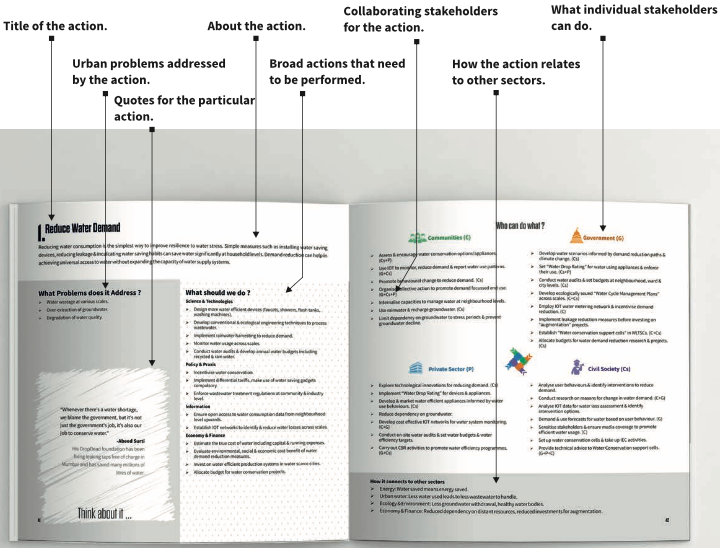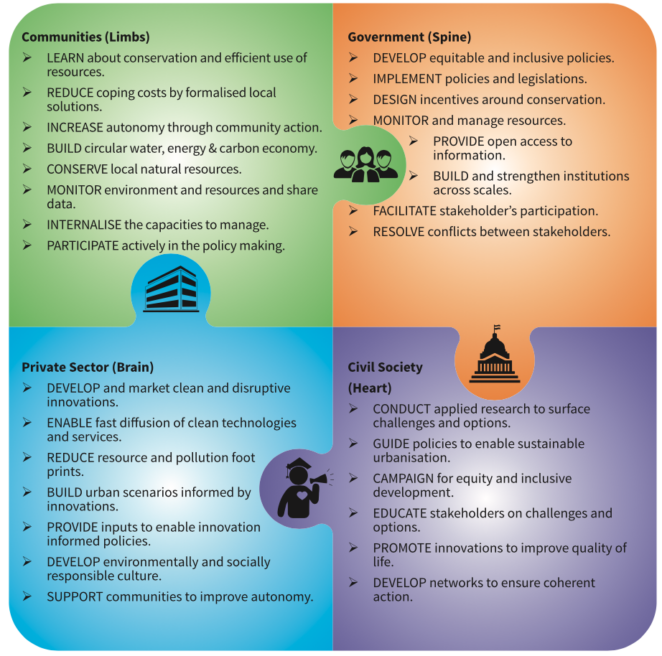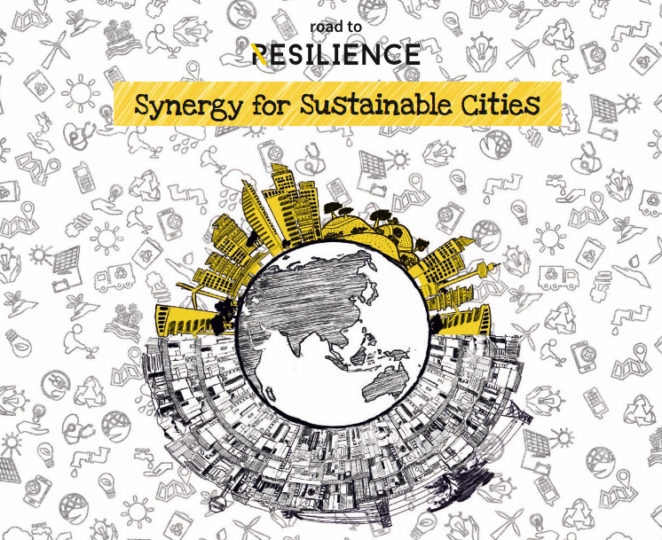Synergy for Sustainable Cities

Introduction
Climate change and increased urbanisation are exerting huge pressure on cities, both in India and elsewhere in the world. In order to anticipate and adapt to changes in climate and related impacts, cities need to build resilience by incorporating lessons from past experience and science into urban development and management.
Sustainability plays a significant role in ensuring long-term resilience. Learning how to life with the resources available, without damaging ecosystems and the environment, is essential. Creating spaces for non-government stakeholders such as citizens, civil society and the private sector to contribute to making cities better places to live is necessary to relieve pressure on governments, and to create a culture of responsibility for the future.
This book* by TARU Leading Edge is the second in a series on the urban challenges we face in the developing world. As with the first, “Road to Resilience: A guide to increasing the resilience of cities“, it provides an optimistic vision that can be easily understood by different stakeholders, with a provocative perspective on how actors need to change in order to cooperate in new ways.
This volume offers a range of proven, practical actions covering policy, implementation and monitoring systems that can be advanced collectively, and is written for multiple audiences with varying knowledge levels. It sets out a framework that can be adapted to diverse urban contexts across developing countries, advocating a blend of technological, institutional and social options to enable transformation towards sustainable cities. Most importantly, it continues in the vital effort of engaging stakeholders in an informed conversation about the future of our cities, and how we can work to increase the well-being of all who reside in them.
In the book
This book starts by taking the reader on a journey through Gadbadganj, an imaginary city facing significant challenges arising from climate change and increasing urbanisation. It then introduces urban resilience and sustainability – the issues and challenges and motivations for addressing them. It provides an overview of the stakeholders, including reasons why they may be disconnected with these issues, and suggests roles (see below) they could play to support to enhance their and their city’s resilience. It then presents specific actions for resilience building in urban contexts, with a focus on water, energy, transport (mobility) and environmental health.
*Download the full text from the right-hand column. You can also listen to an audio abstract here.

Key Messages
From the foreword by Ashvin Dayal, Associate Vice president and Managing Director of the Rockefeller Foundation (page 2 of the full text)–
We need to use a number of emerging opportunities to enable a constructive environment for increasing resilience and ensuring the sustainability of our cities:
- Changing resource use patterns: The assumption that there are sufficient resources to support cities is increasingly threatened by the pace of growth and uncertainties introduced by climate change. Innovations and increasingly cost-effective technologies in areas such as decentralized solar energy and water recycling can be leveraged to improve resilience and build synergies across scales, while simultaneously reducing the impact on our ecosystems.
- Leveraging information technology: Decision-making needs to be grounded in smart, real-time data in an increasingly complex urban environment where trends and patterns are becoming harder to predict based on historical norms. Disruptive innovation in communication and computational technologies have become affordable and can help in understanding behaviour, unravelling complexity and addressing legacy challenges. These big data sets can help in developing an anticipatory culture in cities, and transform the awareness of policy makers, citizens, businesses and other stakeholders.
- Refining stakeholder roles: We need multi-stakeholder platforms to enable a much more deliberative process of policymaking to develop inclusive, resilient and sustainable cities. Complex urban management processes and transformative solutions cannot be guided by governments alone. We increasingly need concerted efforts to engage local communities, the private sector an civil society to create new partnerships to generate resilient urban economies and ecologies.

(0) Comments
There is no content